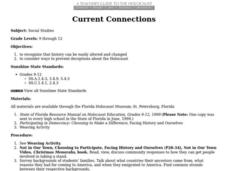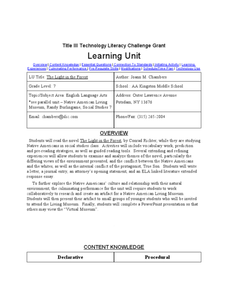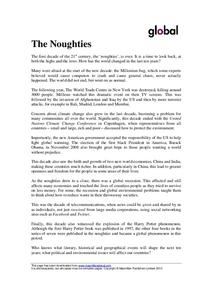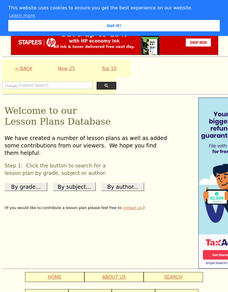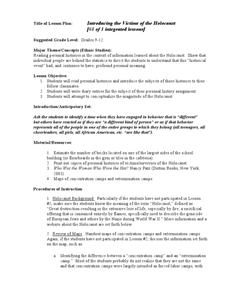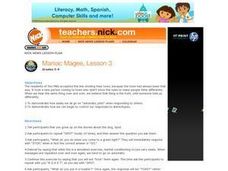Learning for Justice
Beauty is Skin Deep
If you are in need of a instructional activity on tolerance or the impact of media, this plan could be useful. The class begins with a brainstorming session in which they reflect on their own experiences with bias based on appearance....
Curated OER
Using Picture Books to Teach the Holocaust
Students compare a photo of a child's room during the Holocaust to their room. In this WWII lesson, students read picture books and evaluate the roles of characters in the book. Students create either a poster about the roles, a movie...
Curated OER
Daniel's Story Study Guide
Students explore the plight of Jews during the Holocaust. In this World War II lesson, students read Daniel's Story by Carol Matas and complete the provided comprehension, characterization, and vocabulary activities.
Curated OER
Everything You Know Is Wrong 1: Us and Them
Students explore rational, irrational, analytical and non-analytical methods of reasoning. They participate in numerous exercises and hands-on activities to understand assumptions and how most people think. Students establish the...
Curated OER
What Does Racism Mean in Europe Today?
Students consider race relations in modern-day Europe. For this current events lesson, students visit selected websites to understand the impact of Nazi symbolism, the Holocaust denial, and the stories of Holocaust survivors.
Curated OER
Current Connections
High schoolers recognize that history can be easily altered and changed, and consider ways to prevent deceptions about the Holocaust. They create class quilt that shows how to create harmony, understanding and tolerance of others.
Curated OER
Native American Culture: The Light in the Forest
Seventh graders read the novel, The Light in the Forest. They work in groups to research and create artifacts for a Native American Living Museum. They complete a Powerpoint presentation of their virtual museum to classmates.
Curated OER
The Noughties
In this World History worksheet, 9th graders read an article and answer nine comprehension questions. Students write definitions to vocabulary words.
Curated OER
Celebrating Martin Luther King, Jr. Day
Students honor Dr. Martin Luther King, Jr. and the principles he stood for: justice, equality, freedom, and peace.
Curated OER
African Americans in World War I - Lesson Two
Students explore the decision to allow African Americans enlist in the military. In teams of three to four, students debate allowing Muslim Americans to enlist in the war. Students not participating in the debate serve as legislatures....
Curated OER
Ethnic Diversity
High schoolers explore the ethnic diversity of the British military. In this diversity lesson, students discuss the British West Indies Regiment rebellion and the reasons they believed it took place. High schoolers also study the...
Curated OER
The Lavender Llama
Students explore friendship, discrimination, prejudice and tolerance.
Curated OER
Is Racism Dead?
Students investigate events surrounding the integration of Little Rock (Arkansas) Central High School and explore racial harmony in their own school. Included: A survey to determine whether racism is dead at your school.
Curated OER
Nevada Native Plants and Animals
Fourth graders explore the Washoe people and their history among non-Washoe. The lesson focuses on not only the traditional, but also on the contemporary ways of life of the Washoe people. The unit consists of thirteen lessons.
Curated OER
Social Reformation-Irish Immigration in the 1800s
Students discuss the causes of the influx of Irish immigrants between 1800 and 1875. They focus on what immigrants' lives were like in the United States and what impact the move across the Atlantic had on thier families. They complete a...
Curated OER
Introducing the Victims of the Holocaust
Students consider the plight of Holocaust victims. In this World War II lesson, students discuss the number of Jews who were persecuted during the war and read biographies by Holocaust survivors. Students compose essays on personal...
Curated OER
Maniac McGee, Lesson 3
Students explore possible causes of stereotyping. In this multicultural awareness activity, students participate in activities in which "conditioning" affects responses. Students compare their conditioned responses to possible community...
Curated OER
Those Who Don't Know: Identity, Membership, and Stereotypes
Students explore their identities. In this social studies lesson, students examine stereotyping and discuss factors that define their personal identities. Students compare their stories to the story of Esperanza in the novel Esperanza...
Curated OER
World War II Holocaust Introduction
Students explore the concept of identity by categorizing themselves based on physical characteristics. In this Holocaust lesson, students discuss the differences between their classmates and separate each other based on petty...
Equality and Human Rights Commission
Equality
Despite passing the Equality Act in 2010 covering many groups, gender inequality in Great Britain remains. Scholars investigate the concept of equality with a presentation, discussion, and hands-on timeline activities. The seventh lesson...
Mississippi Whole School Initiative
Dream Big...With Your Eyes Wide Open
For many people, Barack Obama's presidency was the next step in Martin Luther King, Jr's dream of America's future. Explore the dreams of Americans past and present, as well as the young Americans in your class, with a set of activities...
Digital Public Library of America
Teaching Guide: Exploring To Kill a Mockingbird
Harper Lee's To Kill a Mockingbird, considered by many to be a seminal piece of American literature, contains many complex literary themes that carry through United States history. Use a series of discussion questions and classroom...
Facing History and Ourselves
Life for German Youth in the 1930s: Education, Propaganda, Conformity, and Obedience
The German youth faced an onslaught of propaganda when they went to school, thanks to the Nazi regime led by Hitler during World War II. Pupils relate their education experiences to German youth by analyzing primary source readings,...
Facing History and Ourselves
Transcending Single Stories
The focus of the second lesson in the Standing Up for Democracy unit is on the power of assumptions based on a single experience or point of view. Class members begin by journaling about assumptions others make about their identity based...





